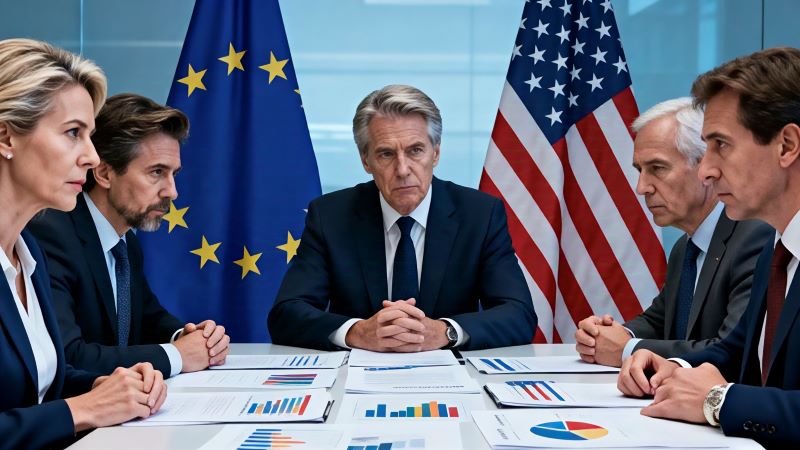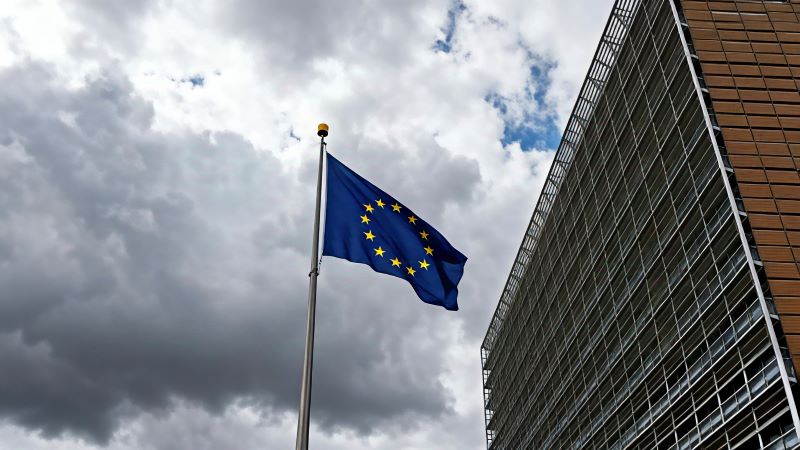Recently, Klaus Larres, a prominent German scholar, researcher at the Wilson Center’s Global Europe and Kissinger Institute on China-U.S. Relations, and professor of history and international affairs at the University of North Carolina at Chapel Hill, visited the Chongyang Institute for Financial Studies at Renmin University of China (RDCY). He delivered a latest public speech at the 17th session of RDCY’s Regional and Country Forum “U.S. Series” titled “The EU at the Crossroads: Seeking Strategic Autonomy Amid China-U.S. Rivalry,” sharing insights on the current state of EU-US relations and China-EU relations.
Trump’s Potential Return Adds Uncertainty to EU-US Relations
The global geopolitical landscape, particularly for the U.S. and Europe, is confronting unprecedented challenges. Since World War II, the international order has gone through the Cold War and the formation of the transatlantic alliance. In the 1990s, the U.S. gradually became the most influential country globally, even considered a unipolar power. Since China’s accession to the WTO in 2001, the international political pattern has undergone profound changes, which are also reflected in EU-US relations—issues such as the Iran question, Russia policy, and trade and economic conflicts have brought multiple challenges. Notably, the potential return of Trump to the White House is posing new challenges to EU-US relations in an unprecedented manner.
In terms of transatlantic security, the U.S. has continued to push European countries to increase defense budgets. In recent years, many European countries have been required to raise defense spending to 2% of GDP. After the full-scale outbreak of the Ukraine crisis in 2022, Trump further called for NATO to increase defense budgets to 5% of GDP, a demand that has exacerbated differences between the U.S. and Europe and made NATO’s goals more difficult to achieve.
NATO relies on Article 5 to commit to collective defense, but currently, the arms stockpiles of many European countries—whether missiles or tanks—are insufficient. While NATO member states are striving to effectively implement Article 5, the future evolution of the situation, especially Trump’s possible decisions, remains highly uncertain. At recent NATO summits, Europe generally felt a lack of security and certainty and has not yet had the conditions to substantially improve transatlantic relations and NATO’s capabilities.
EU’s Trade Dependence on U.S. Exacerbated by Tariff Risks
The EU is highly dependent on the U.S. in terms of trade. More than 30% of the EU’s goods are exported overseas, with the U.S. market being particularly important, especially for major economies like Germany. The U.S.’ recent tariff hikes, especially the series of tariff increase policies proposed by Trump, have posed severe challenges to the EU.
Many European countries are concerned because exports, especially to the U.S., are a key pillar of their economic growth. Even if trade volumes remain unchanged, tariffs will reduce Europe’s economic interests, which will affect the cooperative atmosphere between the two sides and may further intensify EU-US tensions.
Additionally, Trump has no affection for Europe and is unwilling to engage with the 27-member EU. He prefers to communicate directly with the leaders of individual countries such as the German Chancellor, British Prime Minister, and French President in a business-like manner, believing that direct communication with a single country gives him greater say and that individual negotiations are easier than consulting with the EU as a whole. However, the 27 EU member states have formed a strong economic community, leaving Trump facing difficulties in reaching agreements with the EU as a whole.
Within the EU, there are also differing attitudes toward the U.S. Germany, which has accumulated extensive experience in cooperating with the U.S. since World War II, is more inclined to reach agreements with the U.S. France, on the other hand, holds the view that Europe should not be dominated by external countries and hopes to achieve European strategic autonomy and ensure European security independently of the U.S.
Given that the UK and France have far fewer nuclear weapons than the U.S. and cannot resist U.S. military power, Europe still hopes to receive U.S. support and protection. If the U.S. cuts off its protection, Europe will face a significant reduction in intelligence and satellite information support, which it cannot afford. Thus, the EU needs to continue cooperating with the U.S. due to its dependence, while also aspiring to achieve more independence— a goal that will take a long time and may come at a high cost.

EU’s Complex Mechanisms Hinder External Cooperation
The EU was initially established primarily to resolve conflicts between Germany and France. Today, it has become the world’s most successful single market: for example, Belgian companies can easily sell computers to Spain, Germany, or Poland without additional certification or approval, which greatly reduces transaction costs and promotes trade development. The unification of the EU currency also once drove rapid economic growth.
However, the EU’s overall structure is highly complex, with many competing institutions and countries involved, as well as national governments. Coordinating 27 countries to work harmoniously is inherently difficult. In terms of foreign policy, it is still dominated by major countries such as Germany and France, rather than being a true collective EU foreign policy, and each member state holds the right to veto—even major countries face obstacles when promoting their own foreign policies.
A key unresolved issue is whether EU member states have the right to cooperate and trade with non-EU countries on behalf of the entire EU. According to current regulations, if the German Chancellor intends to negotiate directly with the U.S. President, he or she must obtain the approval of EU Commission President Ursula von der Leyen and the EU Commission. This means the German Chancellor cannot unilaterally decide U.S. policy or cooperation with China, as the EU’s complex mechanisms impose restrictions.
China-EU Relations: Addressing Challenges to Deepen Cooperation
In trade, Europe is no longer as highly dependent on China as it once was. It fears that if China cannot meet its demand for certain goods, supply chain disruptions may occur—a concern that also reflects protectionist factors. Nevertheless, all parties still hope to cooperate, but trade methods have become more cautious, with an emphasis on supply chain diversification to avoid “putting all eggs in one basket.”
The 2025 China-EU Summit was held in Beijing. Annual dialogues are held in Brussels or Beijing to deepen discussions on key issues and celebrate friendly relations between China and European countries.
Currently, China-EU relations face some tensions, mainly stemming from the trade deficit: Europe has a large trade deficit with China and hopes to further open markets to enable European companies to better access the Chinese market. Beyond trade deficits, China and the EU also need to address important issues in other industries, such as the export of medical equipment and market access in each other’s countries, as well as the promotion of more open cooperation in chip technology and artificial intelligence technology.
Despite the challenges ahead for China-EU cooperation, all parties must make every effort to avoid further global division and promote global solidarity and cooperation to move forward together.












